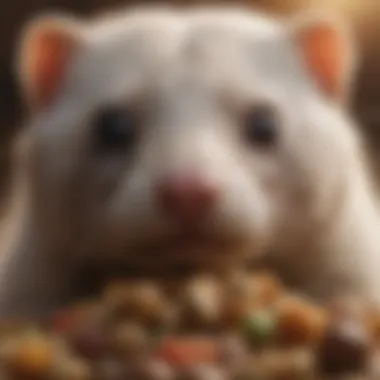Essential Carnivore Care Guide for Ferrets


Intro
Caring for ferrets requires understanding their unique needs, particularly concerning their carnivorous diet. These small mammals have specific nutritional requirements that owners must be aware of to maintain their health and happiness. This guide explores the various aspects of ferret care, especially focusing on dietary considerations, health management, and enrichment practices.
Understanding Your Pet
Pet Behavior Basics
Ferrets are curious and energetic animals. They exhibit a wide range of behaviors that can be fascinating to observe. They are social creatures, usually preferring company, whether that's from their human caregivers or other ferrets. Understanding their body language is crucial. For instance, when ferrets 'dooking', a unique sound they make, it typically indicates excitement or playful behavior. Additionally, they might engage in 'weasel war dances', an expression of joy and energy.
Common Breed Characteristics
While most ferrets share general features, there are subtle variations among different breeds. The most common, such as the European polecat or the domesticated ferret, can vary in coat color and size. However, their skeletal structure and feeding requirements remain relatively consistent. It's beneficial for owners to recognize these characteristics, as they can influence care and feeding routines.
Species-Specific Needs
Ferrets have a distinct biochemical makeup that necessitates a high-protein, low-carbohydrate diet. Their digestive systems behave differently compared to animals that are omnivorous or herbivorous. Proper understanding of their nutritional needs is integral to preventing illnesses and ensuring long-term health. This need for protein can also affect their behavior, as a lack of proper nutrition can lead to lethargy or irritability.
Pet Care and Maintenance
Feeding Guidelines
Establishing a proper feeding routine is vital for ferret care. High-quality commercial ferret food is recommended, as it provides essential nutrients. Ideal food should contain around 30-38% protein and less than 20% carbohydrates. Additionally, raw meat and whole prey can serve as supplementary options. Remember to monitor their weight and adjust food portions accordingly.
Grooming Essentials
Though ferrets are generally low-maintenance in terms of grooming, regular brushing is important to keep their coats healthy. This is particularly relevant during shedding seasons. Bathing should be limited, as excessive washing can strip natural oils from their skin. If needed, mild pet shampoo can be used.
Hygiene Practices
Maintaining a clean habitat is essential for ferret health. Daily cleaning of litter boxes and regular washing of bedding will help prevent infections. Their cage should be cleaned with safe, non-toxic disinfectants. Regular observation of their behavior and environment will also allow owners to swiftly address any emerging issues.
Training and Development
Basic Commands and Skills
Ferrets can learn basic commands, and starting training early is beneficial. Using positive reinforcement with treats can motivate them. Commands like 'come' and 'no' can be taught effectively with patience. Training not only enhances the bond but also provides mental stimulation.
Behavioral Training Techniques
Behavioral issues such as biting can often stem from fear or stress. Using gentle corrections and redirecting their focus can help modify such behaviors. Remaining calm and consistent is key in any training efforts to aid a ferret in understanding what is expected of them.
Addressing Common Behavior Issues
One common issue faced by ferret owners is their tendency to chew on items around the house. Providing ample chew toys can help curb this behavior. If a ferret exhibits excessive digging or destructiveness, ensuring they have enough playtime and stimulation is crucial to mitigate boredom.
Health and Wellness
Routine Vet Check-ups
Regular veterinary check-ups are vital to monitor ferrets’ health. These appointments allow for preventive care and ensure that any potential health issues are addressed early on. Generally, it is advisable to visit the vet at least once a year for an overall health assessment.
Vaccination Needs
Vaccinations are crucial in protecting ferrets from common diseases. The most recommended vaccinations include distemper and rabies. Timely vaccinations can save ferrets from serious health risks and are a crucial part of responsible pet ownership.
Recognizing Signs of Illness
Ferrets are adept at hiding their illnesses, making it important for owners to be vigilant. Signs such as lethargy, changes in appetite, or unusual behaviors can indicate that something is wrong. Immediate veterinary consultation is advised under such circumstances to secure prompt intervention, if necessary.
Enrichment and Activities
Indoor vs.
Outdoor Activities


Providing opportunities for both indoor and outdoor activities enriches a ferret's life. While indoor play is essential, safely supervised outdoor exploration can provide new experiences. Understanding your ferret's behavior and preferences can help tailor these activities.
Interactive Toys and Games
Interactive toys can stimulate a ferret's mind and help maintain its agility. Consider providing tunnels, balls that dispense treats, and climbing structures. These promote physical activity and cognitive engagement.
Socialization Opportunities
Ferrets thrive on social interaction. Whether with humans or other ferrets, ensuring they have opportunities to engage socially will lead to a more balanced and content pet. Consider setting playdates with other ferrets or engaging them regularly during playtime.
Socializing ferrets effectively promotes their mental health and prevents behavioral issues.
This comprehensive overview highlights that ferret care is multi-faceted, requiring attention to dietary needs, health management, and social enrichment. Through understanding and commitment, owners can provide a nurturing environment for their ferrets, ensuring their well-being and happiness.
Understanding Ferrets
Understanding ferrets is crucial for any owner looking to provide the best care for these unique pets. Ferrets have distinct physiological and behavioral traits that set them apart from other small animals. Without a grasp of their biology and behavior, owners may struggle to meet their needs effectively, leading to possible health and behavioral problems.
Basic Biology and Behavior
Ferrets are small, domesticated carnivores from the weasel family. They usually weigh between 1.5 to 4 pounds, with a length of around 20 inches, including their tail. They possess a long, flexible body that enables them to navigate tight spaces. Their keen sense of smell is advantageous for their exploration habits.
Socially, ferrets are very active and curious. They require interaction and stimulation to thrive. Their natural behavior includes burrowing and playful antics. Engaging in playtime with ferret-friendly toys is vital for their physical and mental health. A ferret's social nature makes them enjoy the company of other ferrets as well. Considering this, many owners choose to have more than one ferret for companionship.
Importance of Carnivorous Diet
The dietary needs of ferrets are specialized. As obligate carnivores, ferrets require a diet primarily consisting of animal protein. Unlike humans or some other pets, ferrets do not digest carbohydrates efficiently. Their short digestive tracts are adapted to break down high-protein foods quickly. A proper diet ensures their health and helps to prevent nutritional deficiencies.
When selecting food, it's essential to focus on high-quality proteins such as chicken, turkey, duck, and other lean meats. Raw diets can be beneficial but require careful preparation to avoid contamination. A diet rich in fats is also crucial, but it should avoid excessive carbohydrates.
Remember: Choosing the right diet for a ferret not only affects its health but also its behavior. Ferrets who receive proper nutrition tend to be more playful and engaged.
Understanding the biology and behavioral needs of ferrets lays the groundwork for effective care. This knowledge is vital to addressing their specific needs for a carnivorous diet and nurturing their playful nature.
Nutritional Requirements
Understanding the nutritional needs of ferrets is crucial for their overall health and well-being. These animals have specific dietary requirements due to their unique physiology and metabolism. A diet tailored to their carnivorous nature can enhance their vitality and longevity significantly. Micronutrients, macronutrients, and other vital components must be considered to promote optimal growth and health.
Macronutrients in a Ferret’s Diet
Proteins
Proteins play a fundamental role in a ferret's diet. High-quality proteins contribute to muscle development and repair. Ferrets are obligate carnivores, meaning their bodies rely heavily on animal-based proteins. A diet rich in meat sources ensures they receive essential amino acids necessary for various bodily functions. The key characteristic of proteins in this context is their ability to provide the energy and sustenance that ferrets require to thrive. However, improper sources or ratios can lead to either excess waste or inadequate nutrition. It’s vital to choose high-quality protein sources, like chicken or turkey, to avoid these drawbacks.
Fats
Fats are another significant component of a ferret’s nutritional profile. They provide energy density that is crucial for this playful and energetic species. A diet with around 20-30% fat is typically recommended. This nutrient also aids in the absorption of fat-soluble vitamins, enhancing overall health. The primary advantage of fats in a ferret’s diet lies in providing the necessary caloric intake without requiring large volumes of food. Choosing appropriate fat sources is essential. Animal fats are preferred, as they align closely with their natural diet.
Carbohydrates
Carbohydrates are often a point of contention in discussions about ferret diets. While ferrets can digest small amounts of carbohydrates, they are not essential for their nutrition. In fact, high-carb diets can lead to health issues like obesity and insulinoma. The unique feature of carbohydrates in this context is their limited role in the diet of a ferret. They can provide a quick energy source; however, excessive amounts can be detrimental. It is best to minimize carbohydrate content in ferret diets, focusing instead on protein and fats.
Micronutrients Essential for Health
Vitamins and Minerals
Micronutrients such as vitamins and minerals are vital for maintaining a ferret's health. They play various roles in metabolic processes, bone health, and immune function. A balanced intake of vitamins A, D, E, and specific minerals like calcium and phosphorus is essential. The key characteristic of these nutrients is their ability to prevent deficiencies that can lead to serious health problems. For example, vitamin E is crucial for neurological function and skin health. Supplements might be necessary if the diet lacks these essential components.
Water Intake
Water is often overlooked but is critical to a ferret’s nutrition. Adequate hydration is essential for digestion, nutrient absorption, and overall metabolic function. Ferrets should have constant access to fresh, clean water. The unique feature of water intake is its direct impact on health; dehydration can lead to severe complications, including kidney problems. Therefore, ensuring proper hydration should be a priority for every ferret owner, especially when feeding dry kibble.
Digestive System Adaptations
Ferrets possess a short digestive tract, optimized for a high-protein, low-fiber diet. Their digestive system is adapted to process animal protein efficiently. A rapid transit time is necessary for their high-energy needs. Understanding these adaptations is essential for determining the appropriate feeding strategies and choices in a ferret’s carnivorous diet. Feeding methods that align with their digestive capabilities can improve health outcomes and overall well-being.


Choosing the Right Food
Choosing the right food for ferrets is essential for their overall health and well-being. Ferrets are obligate carnivores, meaning their diet must primarily consist of meat. Selecting suitable food goes beyond mere preference; it impacts their energy levels, coat health, and even longevity. It is crucial for owners to navigate between commercial diets and raw options while being mindful of ingredient quality and nutritional balance. Understanding the nuances of each option helps in making informed choices that benefit ferrets in the long term.
Commercial Diets vs.
Raw Diets
Benefits of Commercial Diets
Commercial diets have become a popular choice among ferret owners for many reasons. These products are tailored to meet the specific nutritional requirements of ferrets. A key aspect of commercial diets is the convenience they offer, allowing pet owners to provide balanced nutrition with minimal effort. Many brands ensure proper protein and fat levels to help maintain healthy weight and muscle.
One unique feature of commercial diets is the use of added vitamins and minerals. These supplements can help prevent deficiencies that may arise from an unbalanced diet. Moreover, many commercial options go through rigorous testing for safety and quality. This aspect can provide peace of mind for owners.
However, it is important to read ingredient labels carefully. Some commercial diets may include fillers or low-quality ingredients that do not benefit ferrets’ health.
Benefits of Raw Diets
Raw diets, on the other hand, provide flexibility and may better align with ferrets’ natural eating habits. Many proponents of raw diets suggest that feeding uncooked meat, bones, and organs promotes a healthier and more energetic ferret. A significant aspect of this diet is the variety it can offer, which might include different protein sources like chicken, turkey, or lamb without unnecessary additives.
Another advantage of raw diets is the potential for improved dental health. Chewing on raw bones can help reduce tartar buildup and promote better oral hygiene. Raw diets are often considered more palatable, leading to a positive eating experience for ferrets.
Nevertheless, it’s crucial to ensure that raw diets are well-balanced and safe to prevent contamination. Owners need a strong understanding of their ferret's nutritional needs when opting for this choice.
Reading Labels: What to Look For
When selecting food for ferrets, reading labels is an important step. Key ingredients to look for include high-quality animal proteins listed as the primary component. Ferret food should have a protein content of at least 30%, with fat content ranging from 15% to 20%. Avoid products that list corn, grains, or by-products as primary ingredients, as these do not fulfill ferrets' dietary needs.
Additionally, it is beneficial to check for added vitamins and minerals, which can contribute to a more complete nutritional profile. Ingredients should be recognizable and free from artificial preservatives or colors. Understanding these factors can significantly influence health outcomes.
Homemade Diet Considerations
For those inclined to prepare food at home, a homemade diet can be rewarding but complex. It requires a thorough understanding of nutritional needs and the correct proportions of protein, fat, and necessary vitamins. Meat should be the primary ingredient, with organ meats and bone included for a balanced diet.
It is vital to research and possibly consult with a veterinarian experienced in carnivorous pets to ensure the diet meets all nutritional requirements. Overall, while homemade diets can be beneficial, they require careful planning and knowledge to avoid deficiencies.
In summary, the choice between commercial, raw, or homemade diets significantly affects your ferret's health. Each option has its merits and potential downsides, making informed decisions crucial for optimal care.
Feeding Practices
Feeding practices are essential in establishing a healthy routine for your ferret. The right practices support their dietary needs, contributing to their overall health and wellbeing. It's not just about filling a bowl with food; it's about creating a structured approach that considers their unique physiology and behavioral traits. A consistent feeding routine enhances their comfort and reduces anxiety.
Feeding Schedule and Portions
Creating a feeding schedule is vital. Ferrets are creatures of habit, and a regular routine helps regulate their digestive system. Typically, ferrets should be fed multiple small meals throughout the day because they have high metabolic rates. Generally, four to five meals daily is recommended.
Portion Control
Portion size is also crucial. Too much food can lead to obesity, while too little can cause nutritional deficiencies. A good rule of thumb is to provide about 1 ounce of high-quality protein-rich food per meal. Adjust portions based on their health, age, and activity levels. Regular weigh-ins can help gauge if your ferret is maintaining a healthy weight.
Important Tip: Always ensure fresh water is available at all times. Hydration is a significant aspect of your ferret's diet.
Transitioning Between Foods
Transitioning between different types of food can be a delicate process. If you need to switch from one diet to another, do not do this abruptly. Ferrets can be sensitive to sudden changes in their diet, leading to gastrointestinal distress. Gradually introduce the new food over a period of 7 to 10 days.
Steps to Transition
- Mixing: Start with a small amount of the new food mixed with the current diet.
- Gradual Increase: Gradually increase the new food portion while decreasing the old food.
- Monitor: Keep an eye on their stool and overall demeanor during this time. Look for signs of discomfort or dietary issues.
Monitoring Dietary Changes
Monitoring dietary changes is integral in understanding how your ferret is responding to food. Health-related issues can often manifest in their behavior and physical appearance.
Observations to Consider


- Weight fluctuations: Regularly weigh your ferret to ensure weight remains stable.
- Behavior changes: Note any sudden shifts in energy levels or activity. A lethargic ferret might not be receiving the nutrients needed.
- Fecal consistency: Healthy stool is firm and well-formed. Changes can indicate dietary intolerances.
Being observant and proactive about feeding practices can lead to a healthier and happier life for your ferret.
Health Considerations
Health considerations are crucial when caring for ferrets. These small mammals are prone to a variety of health issues that can be directly related to their diet. By understanding the link between nutrition and health, ferret owners can significantly enhance their pets' well-being and longevity.
Common Health Issues Related to Diet
Obesity
Obesity is a major concern in ferrets. The lack of physical activity, combined with overfeeding or unsuitable diets, can lead to excessive weight gain. This condition not only affects a ferret's mobility but also increases the risk of other health problems like diabetes and heart disease. A key characteristic of obesity in ferrets is a noticeable roundness in their body shape. This aspect makes it essential to monitor their weight closely. Addressing obesity requires an appropriate diet and an active lifestyle.
- Why is it important? Obesity can shorten a ferret's life span and lead to worsening health conditions.
- Unique feature: Obesity often goes unnoticed until more severe health concerns arise. Regular vet check-ups can help identify weight issues early.
Dental Problems
Dental problems are another health issue affecting ferrets. They are susceptible to periodontal disease, which can occur due to inadequate chewing and poor dental hygiene. The key characteristic of dental problems in ferrets includes bad breath and difficulty eating. This aspect highlights the importance of a diet that promotes dental health, such as those that encourage chewing. Ferrets require food that helps clean their teeth while consuming it.
- Why is it popular? Understanding dental problems gives owners a way to prevent painful conditions.
- Unique feature: Neglecting a ferret's dental health can cause severe discomfort and complications. Regular dental check-ups are essential.
Signs of Nutritional Deficiencies
Recognizing signs of nutritional deficiencies is vital for maintaining a healthy ferret. Common symptoms include lethargy, poor coat condition, and increased susceptibility to diseases. Each of these signs can indicate a lack of essentials in their diet, such as proteins, fats, vitamins, or minerals.
Common signs include:
- Lethargy: A sudden decrease in energy levels can indicate insufficient nutrition.
- Poor coat condition: A dull or thinning coat often reflects poor dietary choices.
- Behavioral changes: A ferret's playfulness and sociability can decline due to nutrient deficiencies.
Maintaining a well-rounded diet can help mitigate these risks and promote long-term health for ferrets.
Behavioral Implications of Diet
Understanding the behavioral implications of diet in ferrets is crucial for their overall health and wellbeing. The food choices made by owners directly affect not only the physical condition of these animals, but also their mental state and behavior. Proper nutrition can lead to a happier, more active ferret, while a poor diet may contribute to behavioral issues, stress, and anxiety. In this section, we will discuss how diet influences behavior and the importance of bonding through feeding.
Influence of Diet on Behavior
Diet plays a significant role in shaping the behavior of ferrets. Ferrets are obligate carnivores, which means they thrive on a diet primarily composed of animal protein. When their nutritional requirements are met with high-quality food, they display increased energy levels. This active behavior promotes exploratory tendencies, allowing ferrets to engage in play and social interaction.
In contrast, a diet lacking essential nutrients, such as proteins and fats, may lead to lethargy and a decrease in playful activities. As a result, ferrets might become less sociable. Below are some key points illustrating the influence of diet on ferret behavior:
- Improved Energy: Properly balanced diets provide the necessary energy for ferrets to remain active and engaged.
- Reduced Aggression: Nutritional deficiencies can sometimes lead to irritability and aggression in ferrets.
- Enhanced Social Interaction: Ferrets on a nutritious diet tend to exhibit better bonding with owners and other pets.
A well-rounded diet not only fuels the body but also supports a positive demeanor in ferrets.
Bonding Through Feeding
Feeding is an essential aspect of caring for ferrets that extends beyond mere nutrition. It provides an opportunity for bonding between the owner and the pet. When owners take the time to prepare and serve meals, it creates a routine that can foster a deeper connection. Here are some important considerations regarding bonding through feeding:
- Routine and Stability: Establishing a feeding schedule makes ferrets feel secure and understood. This stability enhances trust and strengthens the bond with their owners.
- Interactive Feeding: Engaging in interactive feeding activities, such as using puzzle feeders, can stimulate a ferret's mind while also promoting a fun experience shared with their owner.
- Observing Preferences: Paying close attention to a ferret's likes and dislikes during feeding creates opportunities for owners to cater to their pet's individual taste preferences, demonstrating care and attentiveness.
Fostering a good relationship through feeding can lead to better behavior in ferrets. They learn to associate meal times with positive interactions, which can decrease anxiety and reinforce a sense of belonging. Overall, focusing on the behavioral implications of diet is fundamental in caring for ferrets, promoting not only their health but also their happiness.
Closure
The conclusion is a vital component of this article as it encapsulates the primary insights gathered throughout. Ensuring ferrets receive appropriate carnivorous care is crucial for their health and longevity. The information provided serves not just as guidance but as a foundational framework for understanding proper ferret care. This fosters stronger bonds between ferrets and their owners, enriching both lives.
Summary of Best Practices
A few best practices to follow for ferret care include:
- Optimal Diet: Choose a properly balanced carnivorous diet, rich in proteins and fats, while limiting carbohydrates.
- Regular Feeding Schedule: Establish a consistent feeding routine to promote good digestion.
- Monitor Health: Keep a close watch on both physical health and behavioral changes; early detection of issues is key.
- Research: Stay informed about nutritional needs and optimal care practices.
From selecting food to understanding specific dietary needs, these practices lay the groundwork for a healthy lifestyle. Ferret owners should adapt their approach based on observations and research.
Encouraging Responsible Ownership
Encouraging responsible ownership is essential for fostering a safe and nurturing environment for ferrets. A deeper understanding of their unique needs leads to better care. Owners should:
- Educate Themselves: Knowledge is power. Learning about ferret behavior, health risks, and dietary requirements is important.
- Adopt From Reputable Sources: When acquiring a ferret, choose trustworthy shelters or breeders who prioritize animal welfare.
- Stay Engaged: Regular check-ups with a veterinarian experienced in ferret care can prevent many health problems.
- Be Prepared for Commitment: Owning a ferret is long-term, and they require dedicated time and resources for care.
By integrating these principles into daily care routines, owners can significantly influence the happiness and health of their ferrets. This leads to a rewarding companionship built on mutual understanding and care.







